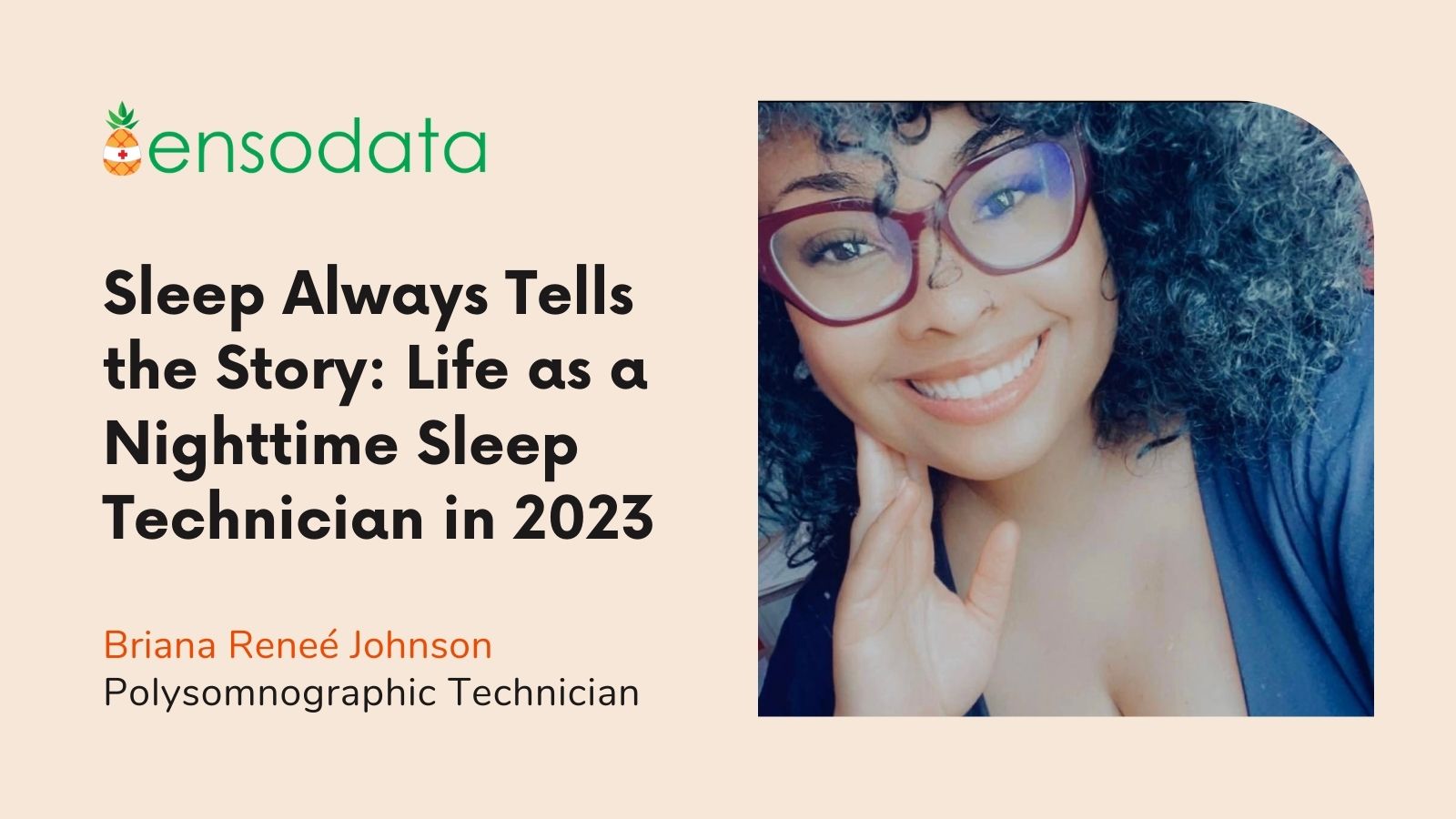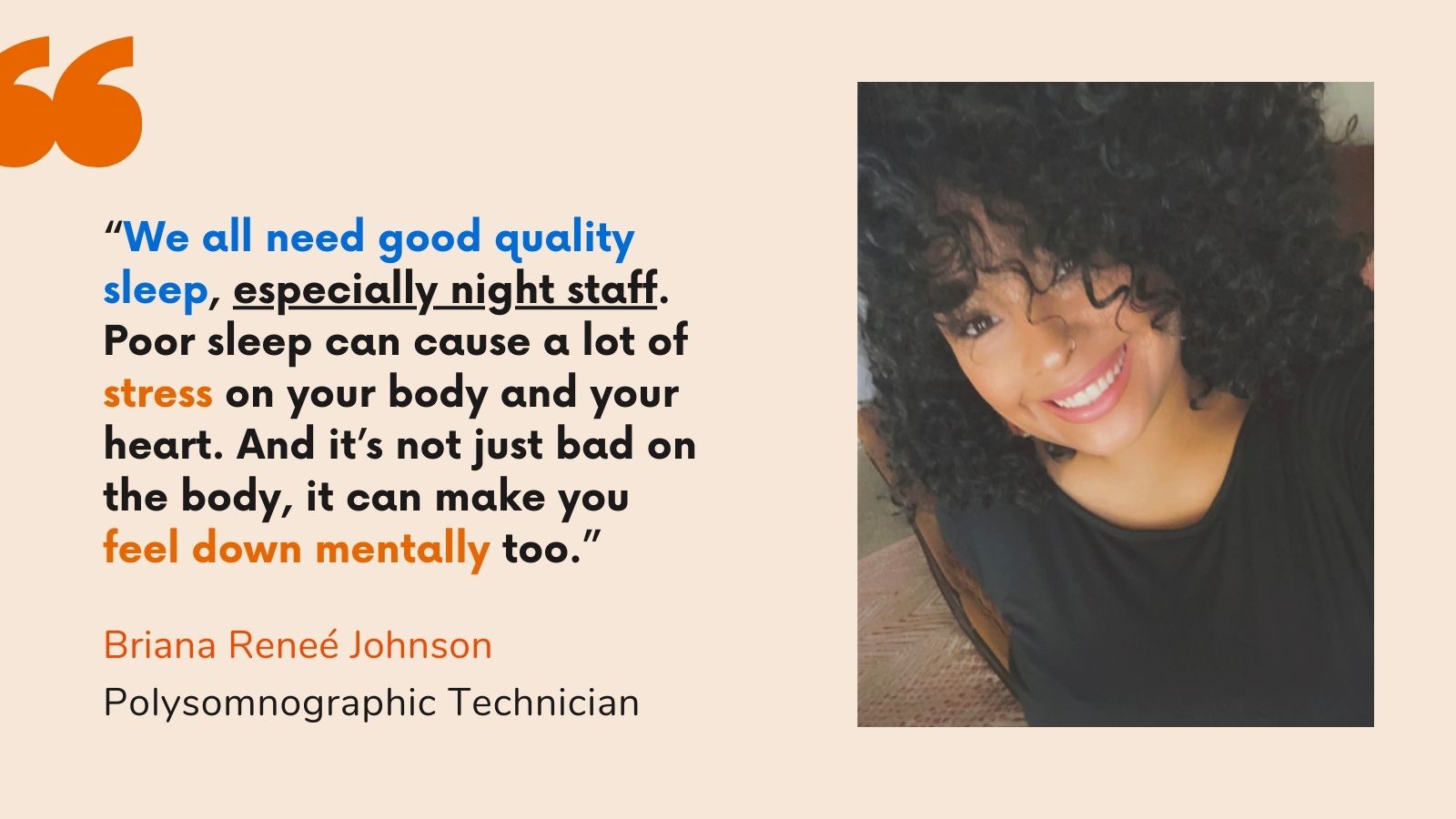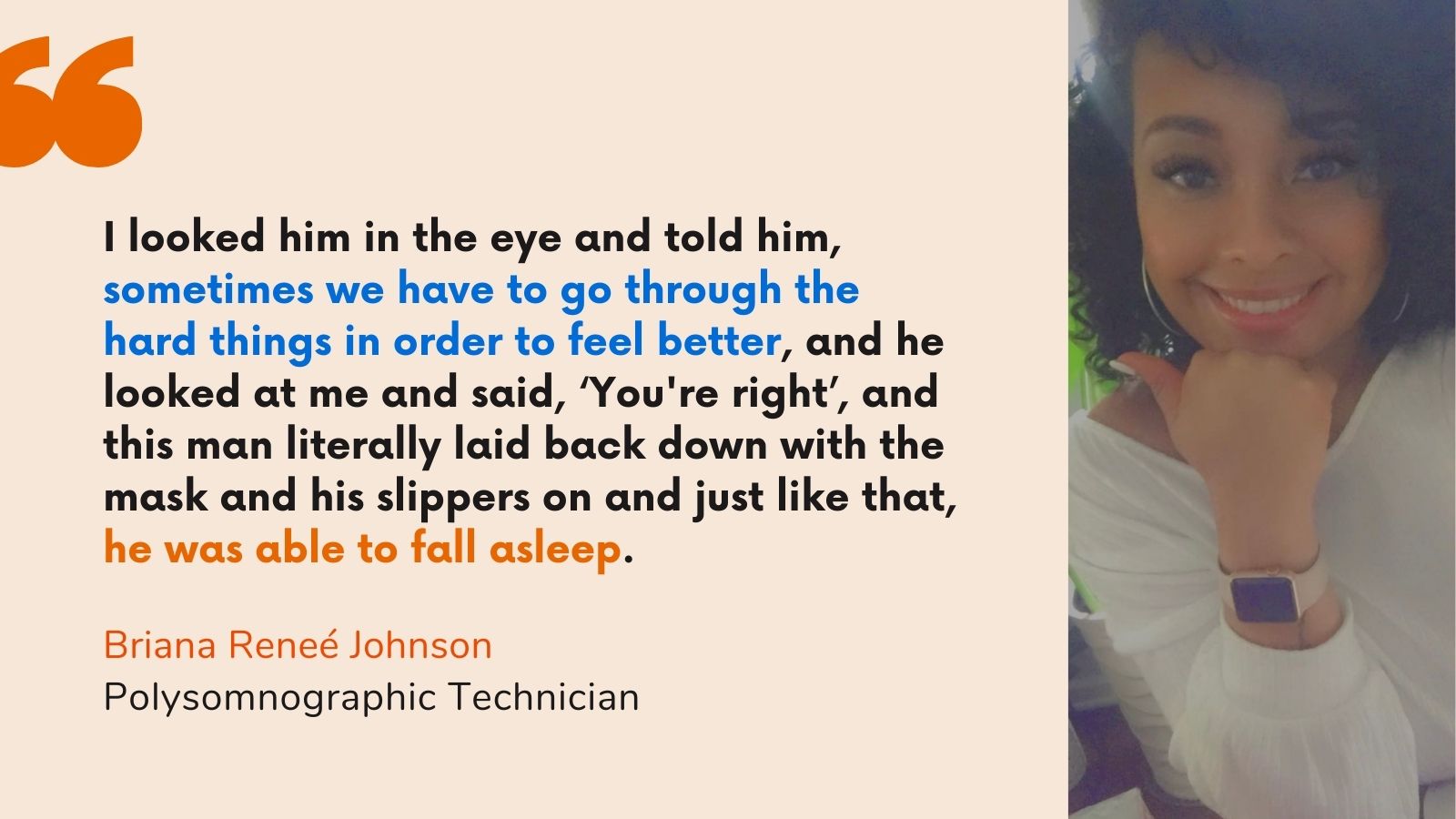Better Sleep is Just a Night Away in this Story of an Alabama Sleep Lab Night Technician
For this story, we head down to sweet home Alabama to meet a warm, open, approachable soul: Briana Reneé Johnson. Over the past 7 years, Briana has worked as an overnight sleep technician with the Jackson Sleep Disorder Center (JSDC), outside Montgomery, AL. The fully accredited sleep diagnostic facility performs over 2,000 sleep studies per year, and for one in five patients, that means a night in Briana’s care.
In our story, Briana shares some of the challenges she’s experienced in the world of overnight sleep care. She also underscores common themes among the patients that typically come through the JSDC sleep labs. To close, she comments on the importance of night techs prioritizing their own sleep.

Meet the Warm, Insightful, and Joyous Briana Reneé
Briana is one of the happiest, smiliest participants we’ve had the pleasure of interviewing for a sleep story. Her infectious energy was evident through Zoom, and for patients and colleagues alike, experiencing her joyous vibe in person is an important factor in feeling comfortable and ready for a sleep test in the lab. Her personality was highlighted by Briana’s former supervisor and lead technologist, Lacey Adams, who now leads the sleep coaching efforts at EnsoData.
“I was thinking of ways to support the behind-the-scenes heroes of Black History Month, and Briana, my sweet friend, came to mind as someone I’d love to see highlighted as a beautiful black woman who is an incredible sleep tech, author of two children’s books, and precious human all around!” shared Lacey Adams.
A former preschool teacher, a loving and doting aunt, an author of several children’s books (Teddy and The Shoestring and All the Foods), and a passionate patient educator, sleep medicine wasn’t a “calling” for Briana. But, it did become an unexpected, and wonderful fit, one with more opportunities to pursue in the future.
Briana’s Journey into Sleep Medicine
When Lacey first recruited her to sleep medicine, Briana admits she didn’t know anything about sleep apnea, narcolepsy or insomnia beyond what she’d seen in movies. She didn’t know what a PSG was, and she definitely wasn’t “looking” for a career in sleep. On the contrary, she was actively vetting both cosmetology schools and various medical programs, all while working at a daycare center.
That’s when Lacey connected with her about the on the job training opportunity at JSDC. It wasn’t “love at first sight,” but the sleep studies and the data really intrigued her.
“I walked in, and I saw these squiggly lines going across the screen and I was like, ‘What is this? I’ve never heard of this.’ And now, I’m able to read studies in my sleep,” said Briana. “Lacey helped me get into it, and I’m grateful.”
Having a mentor in sleep medicine is always important, as the shift from working standard hours to an overnight role comes with a variety of new challenges. That’s why Briana aims to take new techs under her wing and help them get into a rhythm.
Early Challenges Sleep Lab Night Technicians Face
When Briana started as an overnight technician, her habits changed, her sleep changed, and her life changed. When working in sleep medicine, it’s easy to understand how important sleep is to overall health. Sleep professionals often preach to their patients: without high quality and quantity of sleep, overall performance suffers. For night techs, adjustments to personal sleep schedules is also one of the early challenges of the job.
At the beginning of her time as a night technician, it was important to develop a consistent sleep schedule. Black out curtains, noise machines, and hard stops on screen and phone usage can go a long way toward getting on a healthy sleep cadence. However, Briana’s personal sleep hygiene ebbs and flows with her work. With 6 nights on and then 7 off, sleep is often elusive. But finding time for sleep is crucial to succeeding as a night technician.
“We all need good quality sleep, especially night staff. Poor sleep can cause a lot of stress on your body and your heart,” said Briana. “And it’s not just bad on the body, it can make you feel down mentally too.”

Briana emphasized the importance of feeling good for a night shift, and how much your own personal energy matters in patient care.
Beyond advice on the ways to get a good night of sleep, Briana also highlighted a key message for new night techs who are just coming into sleep, don’t be overwhelmed, and try not to compare yourself to those teaching you. As an experienced tech on staff, Briana supports new technicians during training: “I tell them, don’t compare your day one to my year six.”
Briana does an excellent job encouraging techs to give themselves time to learn new things. For a lot of folks, learning the ins and outs of sleep medicine is a lot like learning a new language. And now, Briana is a seasoned pro, enthusiastically supporting patients with their overnight appointments, scoring studies on the fly, and bringing her unique, cheerful spirit to the lab each night to help mentor new techs.
A Day in the Life of a Night Technician
During the day, Briana is likely sleeping, but when she arrives at the lab around 6 PM, the first few hours involve scheduling future patients, managing paperwork for the evening’s tests, and prepping the set-up for her two (or occasionally three) assigned patients that evening. Once the patients arrive, Briana and the other three night techs greet them, familiarize patients with the room, get them hooked up, and finally, hope they sleep.
This whole process requires a lot of empathy and patience. Briana mentioned all sorts of challenges, none more common than general anxiety over the sleep test. For busier nights, Briana might support three patients simultaneously.
“With a 3:1 night, your patients are usually coming in for regular study, but they might be so awful that you split them right away. Some people might not have terrible sleep problems, but they have anxiety or fears to address, and that can hold you up from other patients. You never really know how a night will go,” said Briana.
Flexibility is important. Being able to reset a patient lead, split another patient, and monitor a titration all at the same time demands attentive patient care. And, experience goes a long way toward increasing flexibility with patients. After all, taking a sleep test can be an unnerving, uncomfortable experience for patients.
In addition to general anxiety about the sleep test, many patients coming into the sleep lab also struggle with depression along with their sleep.
“We all have issues and challenges that can make us feel depressed or cause anxiety, but I think a lot of that is because patients are not getting enough sleep. A lot of people actually sleep better being with us, knowing that someone is there watching over them,” said Briana, adding: “I love hearing in the morning, that was the best sleep I’ve ever had, even with all those wires on!”
For many people, their sleep and mental issues are a bit of a chicken in the egg situation, where poor sleep leads to mental fog and diminished performance, and anxiety about performance leads to poor sleep. Finding ways to improve sleep, from a CPAP device to an Inspire implant, can drastically improve overall physical and mental health and wellbeing.
More Patient Education on the Horizon?
In her free time, Briana studies a lot, as she’s excited about more patient education opportunities as her career in sleep medicine evolves. This summer, she will be taking the RPSGT exam, with a goal of following up on it by taking CCSH courses in the fall. The reason she wants to pass these exams? More opportunities for face-to-face education time with patients.
When discussing her studies, she referenced a patient who really stood out as a one of those “best night of sleep ever” situations. He was in for a split, but with the mask on, he simply couldn’t handle the pressure. He was angry, frustrated, bitter, and uncooperative. But Briana was able to call him down, breaking the situation down and giving him a hard, impactful truth:

“I looked him in the eye and told him, sometimes we have to go through the hard things in order to feel better, and he looked at me and said, ‘You’re right’, and this man literally laid back down with the mask and his slippers on and just like that, he was able to fall asleep,” said Briana. “I think because I enjoy educating and talking to my patients, I’d be a good fit for therapy support and outreach. I enjoy what I do now, but I also like the education side of sleep medicine.”
At the end of the anecdote, Briana highlighted that sleep always tells the story. Sleep is the constant in our lives that we need to make sure we take care of. According to Briana, you can always tell how a person is doing just by asking how they’re sleeping, so next time you greet an old friend, start with: “How are you sleeping?”
Great advice, and a better story. Keep on practicing what you preach, Briana. And thank you for sharing your sleep story about life as a night technician. To dive into other sleep stories from our series, check out the links below.






